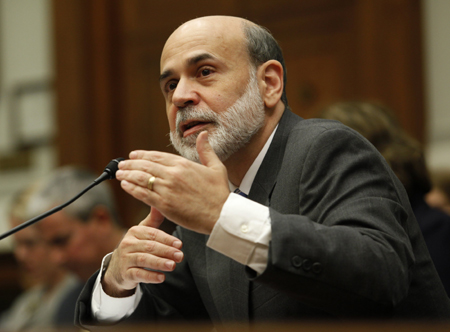|
 |
|
U.S. Federal Reserve Chairman Ben Bernanke testifies before the House Financial Services Committee on financial regulatory reform on Capitol Hill in Washington October 1, 2009.(XINHUA) | U.S. Federal Reserve Chairman Ben Bernanke said Thursday that monetary policy would be tightened when the country's economic recovery looked on a firm footing.
"When the economic outlook has improved sufficiently, we will be prepared to tighten the stance of monetary policy and eventually return our balance sheet to a more normal configuration," he said in a speech on the Fed's balance sheet.
He stressed that he and his colleagues at the Federal Reserve believe that accommodative policies will likely be warranted for an extended period to ensure the economic crisis is overcome.
"At some point, however, as economic recovery takes hold, we will need to tighten monetary policy to prevent the emergence of an inflation problem down the road," said the U.S. central bank chief.
The Reserve Bank of Australia decided earlier this week to boost the overnight cash rate target to 3.25 percent from 3 percent, becoming the first G20 nation to do so, showing fresh signs the global economy is recovering.
"We will calibrate the timing and pace of any future tightening, together with the mix of tools, to best foster our dual objectives of maximum employment and price stability," Bernanke noted.
The Federal Reserve has slashed interest rates to record-low levels close to zero, and has bought all manner of mortgages assets and other securities from financial institutions.
Bernanke said banks could find it profitable to be more aggressive in lending out their reserves, which in turn would boost money and credit supply, and ultimately, lead to inflation pressures.
"As such, when the time comes to tighten monetary policy, we must either substantially reduce excess reserve balances or, if they remain, neutralize their potential effects on broader measures of money and credit and thus on aggregate demand and inflation," he said.
But he also warned the central bank should carry out the so-called "exit strategy" carefully.
"By improving credit market functioning and adding liquidity to the system, our programs have provided critical support to the financial system and the economy," said Bernanke. "We have carried out these programs responsibly, with minimal credit risk and with close attention to the exit strategy."
(Xinhua News Agency October 9, 2009) | 